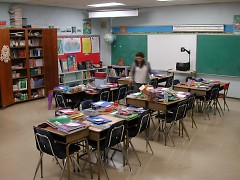I was a straight B and C student all through high school with very little to show after leaving other than a degree. I never cared that much or tried all that hard. I knew from my junior year on that I was going to be a musician/recording engineer. I was going to take two years at the community college in the recording arts program and move on to bigger and better things. Then I walked into my first class in college, a 200-level
accounting class, and I decided I was going to be an accountant. Four years later I am a straight B and C marketing major.
I am far from the person who should be telling people to do their homework and study for exams. I do think that we should look at where our nation, state and city are going as it pertains to education and think about the long term effects. While the whole nation is in a state of flux, we are looking to do what I consider one of the most foolish things we could possibly do: cut education funding.
I went to the Wyoming Public Schools District, where they have only let go a few teachers. However, they have cut the counseling staff down to only one staff member. This means that for 851 students there is only one person to tell those students what they need to do to graduate and help those students figure out post-secondary education goals. This, to me, is a scary thought. I worry about students not wanting to go to college but what scares me more than that are students who are questioning whether or not to even graduate.
Iʼve heard arguments when discussing this topic, ranging from blaming teachers and parents to blaming lazy students. Donʼt get me wrong those things are to blame as well, but I think we can blame those of us who are afraid or too lazy to try and help. Grand Rapids has been spending so much time lately talking about supporting the arts and getting Google to Grand Rapids that we might have gotten ahead of ourselves. The
arts are great and I thoroughly support them and I think our city would be much better off if Google came here but these should be back burner issues compared to education. Most people do not care to look at the actual effect on a community if students drop out. I remember saying to my friends that if that person drops out it is one less person I have worry about fighting for my job. However, the real numbers are a
little scary.
Based on a survey done in 2005 report by the US Department of Education's Institute of Education Sciences, those who do not graduate high school will earn, on average, $9,600 less than those who do. This means that each person who does not graduate will not be able to put that money back into our economy. In addition, "Dropouts also make up disproportionately higher percentages of the nationʼs prison and death row inmates." meaning an that those dropouts will have a higher burden on our local crime and punishment sector. The report also claims that, regardless of income, those without degrees have poorer health than those with a diploma. They are also less likely to have health insurance -- 18 percent less, in fact, according to the Employment Policies Institute.
It seems logical that if those who who drop out are in poor health and they do not have health insurance, they will be less likely to seek medical attention, with no primary care physician, or seek it primarily by use of emergency rooms. These things all have associated costs.
This is where the numbers get really big quickly. Let's say one student dropping out equals $10,000; a mixture of the different factors previously discussed. This number is multiplied with each school in the Grand Rapids Public School District, having 15 drop outs yearly (if each class has 100 students and the school has an 85 percent graduation rate, which is unlikely). Just in Grand Rapids Public High Schools, comprised of seven schools, we would lose $1.05 million in our local economy. This does not include surrounding schools or alternative education or even the Wyoming Public Schools District (Godfrey alone had only a 37.8 percent graduation rate in 2007 according to edweek.org)
Having this information does no good if we are not using it to better educate our young people. People could be going to local high schools and teaching kids the reasons why they need a diploma. I would like to see volunteers mentoring students on how to take out a student loan for college or talking to a classes about how scary and frustrating it might be in high school. It's not that teachers aren't doing a good job, I just think that these budget cuts have made it harder for teachers to do their job and still have time to help students one on one.
I've heard all my life that if you want to play politics safe just run on a campaign saying you support education. Conservative or liberal, that is one that everyone can get behind. But just saying "I support education" doesn't actually get kids to graduate. It is not only our politicians and elected officials that can make these changes.
As a college student, I always planned on leaving the state once I got my degree. I saw foreclosure signs and store closing signs as a sign that this state was dying. And it might be dying, but this could also be an opportunity for us to pick ourselves up and take advantage of this changing economy. We may not make many car parts in West Michigan anymore but we do have a thriving tourism industry. We don't make as much furniture but we do save lives on the medical mile. We need to inspire kids to learn and be creative and seek opportunities to grow and help the community. So, if you actually support education, really do something.
Disclosure: I am working with Wyoming Public Schools to start a volunteer program to help understaffed schools.
The Rapidian, a program of the 501(c)3 nonprofit Community Media Center, relies on the community’s support to help cover the cost of training reporters and publishing content.
We need your help.
If each of our readers and content creators who values this community platform help support its creation and maintenance, The Rapidian can continue to educate and facilitate a conversation around issues for years to come.
Please support The Rapidian and make a contribution today.

